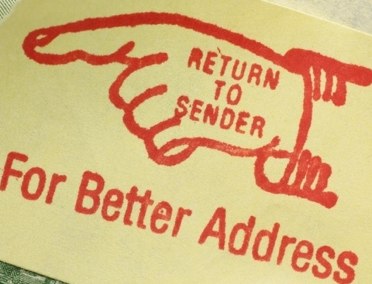Paper Doll Redirects the Mail (Part 1): Permanent Changes of Address
Recently, I’ve been receiving questions about dealing with the red tape involved with changing addresses and having mail directed elsewhere. One client found that her dream house, just across town, became available, and she and her husband snapped it up. The only wrinkle? The move was accomplished so quickly that she hadn’t had time to submit a change of address. Overwhelmed by all of her obligations, she was driving back to her old (unsold, and basically abandoned) house each day to get the mail.

Another client is already concerned with how her daughter’s mail should be handled. The college student will be spending the summer semester abroad but fears coping with mail sent to her parents’ home, her current dorm, her apartment for the fall semester and her little summer sublet.
Yet another client was delighted to find a new job, but less enamored with the idea of relocating for six weeks out of every fiscal quarter to train new divisions as her company expands. A singleton, she’s got no logical person to ask to process her mail.
Relocating, whether it’s permanent or temporary, whether it’s the whole family or just one person (a child going off to college, a spouse ejected after a divorce), can be freeing as well as frustrating. However, with some careful planning, handling your change of address needn’t stress you out.
Today, we’ll start with the essentials for managing a permanent change of address.
TRUST, BUT VERIFY

Verify your exact address with your real estate agent, landlord or apartment complex management. Make sure your new home is properly identified as Lane, Road, Court, Boulevard, Circle — the wrong one could send your mail to neighbors in nearby culs-de-sac.
Double-check to make sure you’ve properly heard the directional terms, like 129 West 81st Street (Jerry Seinfeld, in Apartment 5A) and ask for sound-alike numbers (five/nine, fifth/sixth) to be spelled out (in case you get Mr. Rogers’ old 4802 Fifth Avenue).
If you’re buying a recently-constructed home, triple-check. In some instances, the developer may have changed the street names between when the plans were originally submitted to the post office and the municipality put up the street signs. Also make sure your street is actually registered with the post office — believe it or not, developers sometimes forget this step.
![]()
Search for your address at the United States Postal Service Zip Code Lookup site. Enter what you have of the address, and it should return the proper zip code, including the four-digit extension.
Finally, if your address will be complex or have multiple parts, try to think of a fun or goofy way to make it clear and memorable. For example, I might say, “Shallowford Road — not a deep Chevy, but a shallow Ford.” Silly? Yes, but you (and they) will remember it.
WHO NEEDS TO KNOW? WHO’S ASKING?
Once you know to where you’re relocating, start spreading the news. The following should help get you on your way to recalling everyone you need to notify.
Government Agencies
The Internal Revenue Service — It shouldn’t be surprising that the IRS really wants to make sure they know how to find you. But it’s also to your advantage, to make sure you don’t miss out on any refunds or important notices. Just fill out IRS Form 8822 — it was just updated in January 2012 — and you’ll be good to go.
Social Security Administration — If you or someone in your household receives, or will receive, disability, retirement or survivor benefits and you live in any of the 50 states, the District of Columbia, Puerto Rico, the U.S. Virgin Islands, Guam, the Northern Mariana Islands, or American Samoa, you can use the online system to change your address. For Supplemental Security Income (SSI), however, there is no online option. You’ll have to either visit a Social Security Office in person or call 800-772-1213, Monday through Friday, 7 a.m. to 7 p.m. EST.
Department of Veterans Affairs — Has a member of your household been in the military or do you receive military benefits? Are you the executor of a will or responsible for the estate of someone with military experience? Make sure the VA can find you.
U.S. Citizenship and Immigration Services — Most resident non-U.S. citizens need to report their changes of address within ten days of moving within the United States or U.S. territories and can do so via an online form. The process can be complicated, however, so if you’re not a diplomat or tourist but have a pending immigration case, you might want to avail yourself of the explanation of rules.
Voter Registration Offices — If you are moving to a new municipality, you will have to re-register with your local board of elections. However, if you are moving within the same congressional district, it is likely that you can merely send a change of address form.
Department of Motor Vehicles — Select your state’s DMV to get the right contact data and search for an online change of address page and registration information.
Toll Pass Agencies — Be sure to update your toll pass accounts like New York’s E-Z Pass, Massachusetts’ Fast Lane, Louisiana’s Geaux Pass, Texas’ TXTag and Illinois’ i-Pass.
Unemployment Office — If you relocate while receiving unemployment benefits, it’s essential to keep your state’s unemployment agency notified. BankRate.com has an easy-to-use directory of state offices.
Financial Institutions
Banks and Credit Unions — Contact any company at which you hold accounts
Brokerage houses — For your retirement and non-retirement investments
Credit reporting agencies — Start with Equifax, Experian and Trans-Union and review all the companies that track and report on you. Begin with the classic Paper Doll: Who Knows Your Secrets? series, starting with From Big Sister to Little Brother.
Insurance companies — For auto, medical, dental, life, umbrella and business policies
Lenders — List credit card companies and holders of auto loans, mortgages, personal loans, etc.
Utility Companies
Electric company
Gas company
Sewer service provider
Trash/Waste/Recycling service providers
Water company
Internet service provider
Telephone companies (cell and land line) — Note, the taxes you pay on cellular phone service are determined by the county in which you are registered. If you stick with online billing, it may be to your advantage to keep your cell service registered to your old zip code.
Television service provider — cable or satellite
Household Services
Alarm company
Housekeepers
Lawn and garden care
Pest control
Pool maintenance
Snow plowing/shoveling
Medical Providers
Internists
Pediatricians
Specialists (OB/GYNs, ophthalmologists, endocrinologists, etc.)
Dentists
Orthodontists
Veterinarians
Pharmacies
Other Professionals
Attorney
Accountant
Bookkeeper
Financial advisor
Schools/Caregivers
Daycare providers — for children or elderly family members
School administrative offices — preschool, elementary, middle, or high schools as well as college, whether you are a student, parent or alumni
Online Contacts
Amazon.com and other retailers with whom you have created wish lists
Ebates and other companies from which you commonly receive rebates
Hotel, airline and other frequent-user accounts
Paypal and other online financial organizations
Affiliate programs from which you are expecting commissions.
Personal/Other Contacts
Extended family and friends
Civic organizations and clubs to which you belong
House of worship and religious organizations
Subscription services — Magazines, newspapers, Netflix or video services, game subscriptions, music or movie clubs, etc.
Catalogs — Only contact companies for catalogs you wish to keep receiving.
Business Contacts
Professional associations
Licensing and certification boards
Formal networking groups
This is for business-related personal mail. Obviously, your company should maintain a separate database of client, customer, vendor and association contacts to receive change of business address notifications.
SPREAD THE WORD
Making individual online notifications to government offices and various companies is easy, but not particularly efficient. The most popular way to make sure that nobody is forgotten is to use the Official United States Post Office Change of Address Form. You’ll be asked to designate whether your change of address is permanent or temporary (for which a six month change, renewable once, is allowed).
The site is considered secure, and you will receive an email confirmation from the United States Postal Service once you have successful changed your address. You can even get up to $500 worth of coupons as you process your change through the site.
The service isn’t free — but is practically so. In order to dissuade merry pranksters and ne’er-do-wells, the site charges $1 to your credit card, less as a fee for service and more to protect against fraud.
Paper forms are so 20th century, but you can pick up and drop off change of address forms at your local post office. If you’ve already moved and are still finding your way around, click to find your local post office.
There are also free online services, like Change of Address Form.com and Change of Address.org. However, given that they forward your information to the postal service anyway, Paper Doll is inclined to tell you to go to the source.
TEMPORARY CHANGE OF ADDRESS
There are a variety of reasons one might change addresses, and relocations aren’t always permanent. In fact, sometimes its not just the leave-taking that’s temporary — there are situations (when traveling long-term for work, retiring to live the RV or cruise lifestyle, etc.) when you’re neither here nor there. Your permanent address may exist, but you’re not there, and where you are isn’t always where you will be (tomorrow or next week or whenever).
In our next post, we’ll look at options for handling temporary changes of address, from mail forwarding services to digital forwarding to old-school general delivery and poste restante. Until then, to make sure you get your Paper Doll delivered wherever you’ll be, sign up for the RSS feed. See you at the next mail call!




Follow Me